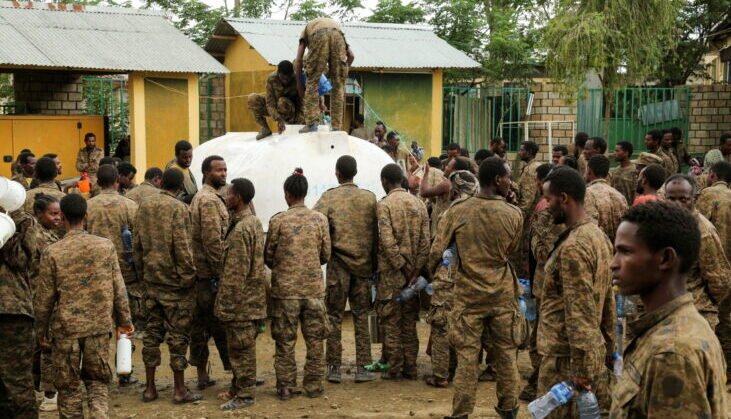The Tigray People’s Liberation Front (TPLF) said in a 20 May statement that it had decided to release the prisoners after discussions with the African Union’s special envoy, Olusegun Obasanjo, who has been leading efforts to mediate between the warring parties. A lull in fighting allowed the largest aid convoy since the March truce to arrive in Tigray this past weekend, buoying hopes for peace.
“[P]er the promise we made to Chief Obasanjo, we have decided to release 4,208 prisoners of war,” the rebel group said. The TPLF said it had agreed to take “confidence building measures” towards a “peaceful resolution” of Ethiopia’s 18 month-long civil war.
It was not immediately clear how the prisoners would be handed over. The Tigrayan rebels called on the international community to “facilitate” their decision “to release captured enemy fighters.”
The International Committee of the Red Cross has previously conducted missions to visit members of the Ethiopian armed forces detained by the TPLF.
The war in northern Ethiopia began in November 2020 and has been characterised by accusations of widespread human rights abuses by both the TPLF and federal forces as well as their allies, including rape and arbitrary killings.
A report last month by Human Rights Watch and Amnesty International accused forces from the Amhara region of conducting a campaign of ethnic cleansing against ethnic Tigrayans in the western part of Tigray. The U.S. State Department has levelled similar accusations.
Tit for tat
Despite suffering initial setbacks, the TPLF managed to recapture most of Tigray in June after mounting a guerrilla campaign in the countryside. Shortly afterwards, the rebel group marched hundreds of captured soldiers wearing federal military uniforms through the streets of the regional capital, Mekelle. The following month the group released more than 1,000 of its captives.
In its latest statement, the TPLF said most of the soldiers due to be released had been captured “during engagements outside Tigray.” It called for the release of thousands of ethnic Tigrayans who were swept up in a wave of arrests that Ethiopia’s national human rights commission has said “appear to be based on ethnicity.”
On 24 March, the government declared a unilateral “humanitarian truce” to allow aid into Tigray, a key demand of the TPLF. The UN estimates that around 90% of the region’s 5.75 million population need humanitarian assistance and its officials have previously warned of famine.
Initially supplies were slow to arrive, with just a handful of trucks reaching Tigray in the weeks following the truce. However, since the TPLF announced its withdrawal from areas it occupied in the Afar region, there has been an uptick in aid convoys to Mekelle, with 319 aid trucks arriving this week, the largest number since June 2021.
Hopes for peace
The TPLF’s decision to release the captured soldiers fuels hopes that both sides are preparing to negotiate and make concessions. A series of talks have been held between the two side’s military officials, but talks between political leaders have not yet taken place, according to diplomatic sources.
“This announcement suggests that, despite slow progress and the lack of involvement of key players from Amhara and Eritrea, the federal and Tigray authorities do seem to still be moving towards peace,” said Will Davison, senior analyst for Ethiopia at the International Crisis Group. “Now, aid flows must continue to increase, critical public services need restoring to Tigray, and the parties need to start discussions on the political disputes that took them to war as they deepen and broaden their truce.”
Phone lines and banking services in Tigray remain down. The TPLF has demanded their restoration, along with accountability for soldiers accused of human rights abuses.
The government has formed an inter-ministerial task force to investigate alleged crimes by all sides and has pledged to prosecute anyone found guilty of human rights violations. It has vowed not to co-operate with a separate investigation by the UN’s Human Rights Council, however.

